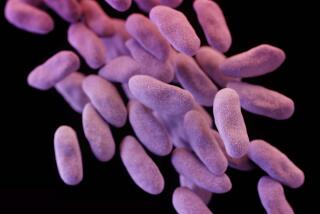Antibacterial soaps may be overrated as germ fighters
- Share via
In households with young children, they have become a standard fixture sinkside. Foamy, glittery, neon-colored or fruity, antibacterial soaps are to today’s parents what a warm hat was to their parents: a guardian against illness and a visible yardstick of good parenting.
As it turns out, plain soap would do just as well. (But don’t forget your hat.)
That’s the finding of a new study, which concluded that using antibacterial products -- soaps or detergents with triclosan, quarternary ammonium compounds or oxygenated bleach -- seemed to make no difference in a family’s likelihood of suffering coughs, runny noses, sore throats, fever, vomiting or diarrhea.
To reach that conclusion, Columbia University nursing professor Dr. Elaine Larson and a team of researchers supplied 238 New York City households, all with at least one preschooler at home, with hand-washing soaps, laundry detergent and kitchen cleansers.
For the next 48 weeks, they checked in with the families weekly to inquire about sickness among family members. Just over half of the families were given cleaning products that contained antibacterial compounds, and the remainder used the same kinds of soap products, but without the antibacterial ingredients.
None of the families knew which kind of cleansers they had received. But when they were queried weekly about how often illness struck, what kinds of symptoms it brought and how long it lasted, the families in both groups reported roughly the same complaints at about the same rate.
Topping the list of symptoms for families in both groups were runny noses, coughs and sore throats, followed by fever and diarrhea. Skin boils and conjunctivitis were reported with the least frequency.
On average, about a third of the households in any given month reported that at least one person in the home had some symptom of infectious disease.
The study was published in the March 2 issue of the Annals of Internal Medicine.
The reason antibacterial agents seem to bring so little added benefit, researchers said, is because in homes, most illnesses are spread by the transmission of viruses from one person to another. Washing with antibacterial soap will wash viruses off hands as well as washing with any soap will. But their additional advertised benefit is that they kill bacteria. And for most people in general good health, killing bacteria in the household setting just won’t make much of a difference, researchers say.
Beyond that, antibacterial cleaning of household surfaces brings only brief protection from germs, past studies have shown.
And only bleach -- not the most commonly used antibacterial agent -- has been shown to kill salmonella and E. coli bacteria.
One difference did show up, and it seemed only to deepen the antibacterial mystery. Among the study’s 1,178 participants, those with chronic diseases (such as diabetes or asthma) or in poor health who used antibacterial soap products were significantly more likely to have a fever, runny nose and cough than the chronically ill who used soap without the antibacterial ingredients. Among preschoolers and children in day care, there were no discernible differences at all.
For Sandra Cortes of La Canada Flintridge, the study results brought good and bad news. The bad news was that the dish soap, the counter cleaner and the endless array of antibacterial pump bottles she’s stocked up on aren’t doing her family any more good than the cheaper stuff she could have bought. The good news is that when her 8-year-old son, William, reaches for the tubside bar of plain soap because it’s closer and dinner’s waiting, Cortes -- an admitted “germ freak” -- can stop worrying.
“It is a little surprising,” said Cortes, who started buying antibacterial products after William was born. “Probably some of it was marketing,” she added. “But I think [the antibacterial label] does give you the sense that it is cleaner or better than soap.”
In nursing homes and some day-care settings, disinfection of the sort that comes with antibacterials has been found to make some difference in rates of illness. But though the benefits of antibacterials in stemming the spread of disease in households have not been demonstrated, brisk marketing and strong consumer demand have made the antibacterial label omnipresent. Three-quarters of liquid soaps and 29% of bar soaps on the U.S. market contain antibacterial ingredients.
Moreover, with antibacterial agents washing over the American landscape, the products may even pose a danger, the study’s authors warned. Under a constant barrage of antibacterial agents, bacteria in our environments (some with good or neutral effects, some that are harmful) could evolve to survive, confronting humans with new strains of bacteria that could be harmful and resistant to the soaps we use. Though the danger has yet to be proved, laboratory tests have shown that such mutations can and do occur, and with the use of antibacterial soaps becoming so widespread, the likelihood of that happening is growing.
For Cortes, acknowledged germ freak, the latest study suggests that she was, at least, on the right track all along -- even if she went further than necessary: Washing hands is a good policy, whatever the soap. But paying more for the antibacterial label is something Cortes thinks she won’t be doing from now on.







